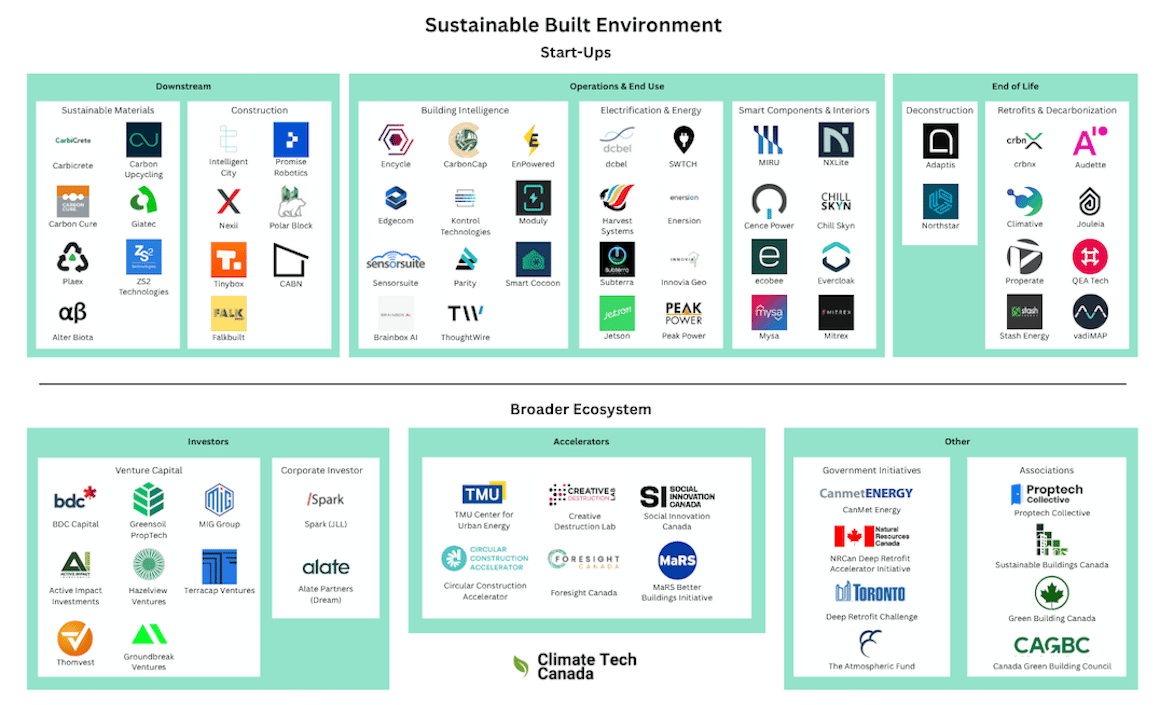Hey there,
Happy Tuesday! Today we’re looking at the latest investment in sustainable aviation fuels.
Boeing is putting up $17.5M for two projects in Quebec and B.C. that will turn forestry waste and industrial carbon into green jet fuel. There’s a ton of demand for sustainable aviation fuel, but supply can’t keep up. These projects are aiming to tap into Canada’s strengths to help close the gap.
We’re also publishing our first ecosystem map looking at the startups, VCs, accelerators and more that are redefining the built environment. We recently sat down with Intelligent City and Properate to talk about how they’re tackling low-carbon construction and retrofits, but there’s so much more! Check it out below and let me know if you want to see more like this in the future.
Elsewhere in climate tech
Lite-1 takes home first place at Web Summit
Lufa Farms partners with Walmart for rooftop greenhouses
Farm Credit Canada pledges $2B for AgTech
P.s. Enjoying the newsletter? Share it with someone in your network! And if you’re that someone, subscribe below.
TECH
Boeing bets on Canadian sustainable jet fuels

Credit: John McArthur
What happened: Boeing is investing $17.5 million into two Canadian sustainable aviation fuel (SAF) ventures. The goal: produce close to 200 million litres of low-carbon jet fuel annually.
Project Avance, a joint venture between Alder Renewables and Bioénergie AECN in Quebec, secured $10 million to convert sawmill residues into an intermediat, low-carbon biocrude for jet fuel production. NY’s Dimensional Energy secured another $7.5 million for a project in B.C. to scale up converting industrial CO2 into synthetic aviation fuel.
How it works: Project Avance uses pyrolysis - heating wood waste without oxygen to produce biocrude, while Dimensional is combining captured CO2 from industrial processes with green hydrogen to produce syngas, which is refined into SAF.
Unlike fossil jet fuel, SAF uses carbon that’s already in the atmosphere, e.g. from biomass or captured emissions, instead of adding net-new carbon, making it a lower-lifecycle-emissions alternative.
Why it matters: Global aviation emissions hit 950 megatonnes in 2023 (almost back to pre-pandemic levels) and are rising. Canada alone burned 8 billion litres of jet fuel last year.
Jet fuel is exceptionally hard to replace due to its high energy density and strict safety requirements. While electric planes are in development, batteries aren’t yet viable for long-haul flights.
SAFs are a critical piece of the puzzle, and industry groups expect them to deliver ~65% of emissions reductions in the sector. But global supply is still tiny. Canada’s forestry byproducts, clean energy, and industrial carbon capture capabilities offer a strategic advantage in producing SAF at scale.
What’s next: Both projects are in the early stages but aiming to ramp up capacity quickly with industry backing from Boeing.
Would you be willing to pay more to fly on SAF?
SPONSORED BY 1440
Unbiased Business Insights, Every Week
Get a weekly knowledge digest of business insights from 1440’s Business & Finance newsletter. Expect concise rundowns, context-rich visuals, and curated links to keep you ahead of the finance curve. Join 1440 for crisp explanations of business trends —no MBA required.
IN THE FIELD
💰 Farm Credit Canada pledged to invest $2 billion in agtech startups by 2030. The government-backed fund aims to draw in more investors to the space and will make investments at early and growth stages, including “catalytic” capital.
♻ Waste-to-fuel company Enerkem filed for creditor protection and could be acquired by Spanish shareholder Repsol.
🧪 Lite-1 won the Web Summit Vancouver Pitch Competition for its sustainable colourants using microbial fermentation, a low-carbon alternative to petrochemical dyes.
🍅 Lufa Farms will launch a hyperlocal produce pilot with Walmart Canada, growing vegetables on Walmart rooftops that can be sold in-store within hours, reducing emissions from transportation. It’s the first retailer partnership for Lufa Farms.
⚡ University of Regina opened a Microgrid Living Lab, an off-grid testbed for clean energy research and microgrid development.
Enjoying the newsletter? You probably know someone else who’d enjoy it too.
Share the link below to spread the word (and earn rewards!)
ECOSYSTEM VIEW
50+ Startups Reshaping the Built Environment
A snapshot of the Canadian startups transforming how we build, heat, power, and retrofit our spaces.
From low-carbon concrete to smart retrofits and rooftop solar, Canadian climate tech startups are reshaping the built environment.
Our last two podcast episodes featured Intelligent City (prefab + mass timber) and Properate (home energy retrofit planning), and they’re just the beginning.
We mapped 50+ startups building the tools, materials, and systems driving the future of better, lower-carbon, and more efficient buildings. Plus the VC funds, accelerators and industry players backing them.
Did we miss someone? Hit reply to let us know!
🙏 A big thanks to Kaden Gulamani for helping put this map together
NEWS
📡 Signals & Currents
Aviation credits market could soar if global cooperation holds: The UN’s CORSIA program is emerging as a powerful voluntary carbon market, with carbon credit prices projected to hit $97/tonne by 2027. Climate obligations and high prices for low-carbon fuels are driving demand for high-integrity credits.
But CORSIA’s future isn’t guaranteed, and largely hinges on political support. The U.S. could leave given Trump’s track record on climate and the EU will review its participation next year.
Signals to watch:
BASF pauses EV battery plant in Quebec. The German chemical giant is reigning in its battery investments.
Canada and N.L. unlock offshore wind. New federal-provincial legislation aims to kickstart Atlantic offshore wind — a $1 trillion global market opportunity by 2040.
Nova Scotia invests in green hydrogen hubs. $3M in new funding backs early-stage hydrogen projects from Innergex and Waterford Energy Services.
Manitoba wildfires trigger state of emergency. Climate adaptation and emergency response are front and centre as we enter another wildfire season.
Trump admin cuts $3.7B in industrial decarb. 24 Clean Energy Demonstration projects across concrete, steel and chemicals had funding cut.
China reclaims battery supply chain dominance. Canada falls to second place in BNEF’s global ranking.
Carney signals its not all about pipelines. The PM wants to accelerate clean energy and infrastructure projects and not default to building pipelines.
Permitting changes need Indigenous backing. Plans to fast-track projects will face Indigenous resistance without consultation.
Paper mills could be the next climate hot spot. Emissions are routinely undercounted at these often overlooked industrial plants.
COMMUNITY
🚀 2025 Targeted Call for Clean Energy Innovation: B.C.’s Innovative Clean Energy fund is seeking applications for electrification affordability, efficiency, and utility energy management. Apply by June 17th.
➡️ Discover more funding opportunities.
🗓 Climate Solutions Prize Festival: This two day festival aims to catalyze a new wave of climate innovation and investment. Montreal, June 17-18th.
➡ Discover more climate events.
🧑🏻💻 Lite-1 is hiring a Director of Science to lead scientific strategy as they build the future of clean dye manufacturing.
➡️ Find more open roles.
Share Climate Tech Canada with your network and help us grow! Make {{ rp_num_referrals_until_next_milestone }} referrals to get a {{ rp_next_milestone_name }}. See all rewards here.


